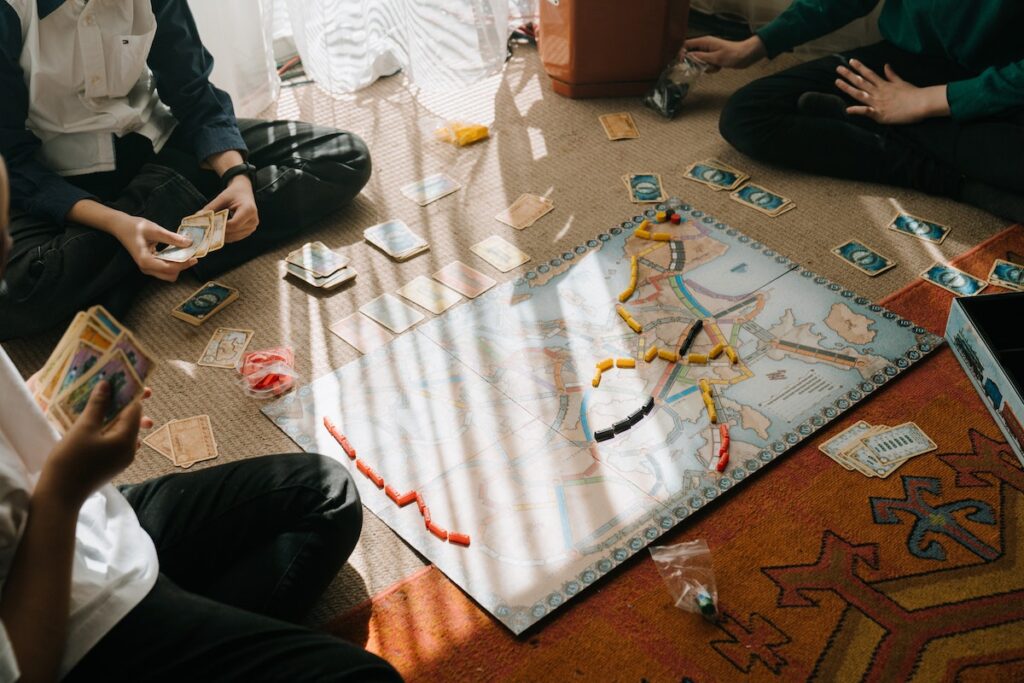Are you looking for a fun and educational way to engage your children while spending quality time together as a family? People of all ages have enjoyed board games for centuries, but their significance in child development is often underestimated. Beyond mere entertainment, board games can enhance various skills and promote children’s healthy social and cognitive development.
This article will explore the interesting world of board games, their incredible benefits for your child`s development, and how to plan and host a family game night.
Let’s get started.
The Benefits of Board Games
Board games are not just about rolling dice or moving game pieces across a board; they offer a wealth of benefits for children. From fostering critical thinking and problem-solving skills to improving communication and cooperation, these games provide a unique and enjoyable learning experience.
Enhanced Cognitive Skills Development
They provide a platform for your little ones to sharpen their problem-solving and critical-thinking abilities. Whether figuring out the best move to advance in the game or devising a strategy to outwit their opponents, board games stimulate their brains in a fun and engaging way.
In addition, these games work wonders for improving memory and concentration. From remembering the rules and specific moves to keeping track of their opponents’ actions, children develop their ability to focus and retain information.
A few examples of such games include:
- Chess
- Monopoly
- Scattergories
- Moods
- Catan
Social and Emotional Development
Board games are more than just entertainment; they provide an excellent opportunity for your child to develop essential social and emotional skills. Playing these games with their siblings, friends, or even with you teaches them the importance of effective communication and teamwork.
Moreover, these games help build emotional intelligence and teach children to recognize and manage feelings and empathize with others. Whether experiencing the thrill of victory or the disappointment of defeat, they learn to handle a range of emotions and develop resilience.
And as they graciously accept defeat or celebrate someone else’s success, they cultivate the invaluable qualities of sportsmanship.
A few examples of such games include:
- Apples to Apples Junior
- Battleship
- Jenga
- Guess Who
- Hedbanz
- Candy Land

Educational Opportunities
Board games aren’t just about fun; they present incredible educational opportunities for your children because they all have unique learning styles. For instance, engaging in word-based games or storytelling activities naturally enhances their language and literacy skills.
Board games also provide a playful context for developing numeracy and logical reasoning. Whether it’s counting spaces on a board or strategizing moves based on mathematical concepts, children develop a solid foundation in numbers and problem-solving
A few examples of such games include:
- Scrabble
- Galaxy Raiders
- Qwirkle
- Monopoly
- Scattergories
- Boggle
Bonding and Quality Family Time
In our fast-paced lives, finding moments for quality family time can be challenging. That’s where board games come to the rescue! These games provide the perfect setting for strengthening family relationships and creating lasting memories.
Through victories and losses, you and your children learn to support and encourage each other, fostering a sense of unity and togetherness. A Kenyan wise saying goes, “Umoja ni nguvu,” meaning “Unity is strength.” Board games provide a platform to practice this unity within your family.
Moreover, playing board games with your children creates cherished memories that will last a lifetime. From the excitement of a close match to the joy of sharing laughter and stories, these moments become a part of your family’s shared history.
A few examples of such games include:
- Twister
- Hungry Hippos
- Game of Life Jnr
Choosing the Right Board Games
Age-appropriate Games
When it comes to selecting board games, it’s essential to consider the age of your children. For toddlers and preschoolers, look for games focusing on simple concepts like colors, shapes, and counting. These games often have large, sturdy pieces and easy-to-understand rules, ensuring a frustration-free experience for the little ones.
Many games offer more complexity and strategic thinking for elementary and middle-grade children. Look for games that encourage problem-solving, decision-making, and logical reasoning.
Even as your children grow into their teenage years, plenty of board games are suitable for family play. Look for games that balance strategy, social interaction, and entertainment.
Educational Value
Some games are specifically designed to promote certain skills or subjects. For example, some games focus on language development, mathematical concepts, or scientific principles. These games make learning fun and allow your children to reinforce what they learn in school.
Engaging and Interactive Gameplay
Consider the gameplay mechanics and complexity to ensure that your chosen board games captivate your children’s interest. Different games offer different levels of challenge and engagement. Some games may have simple rules and quick gameplay, perfect for short attention spans or busy schedules.
In addition to gameplay mechanics, consider games that allow for multiplayer or cooperative play. Multiplayer games encourage healthy competition among family members, fostering strategic thinking and sportsmanship.
Reviews and Recommendations
When venturing into the world of board games, it’s helpful to consult reviews and recommendations to make informed choices. Look for online resources that provide detailed reviews, ratings, and descriptions of board games.

Tips for a Successful Family Game Night
Setting the Stage for Fun
Create a comfortable seating area with cushions or blankets where everyone can gather around the game table. This warm and inviting environment will set the stage for a memorable and fun-filled evening.
Depending on the game, Set the mood by;
- dimming the lights,
- lighting candles, or
- playing soft background music.
Designate a day or time each week or month for family game night. This way, everyone can look forward to the special bonding time and make it a cherished tradition. Whether it’s Friday nights or Sunday afternoons, having a consistent game night schedule ensures everyone can plan and anticipate this dedicated time together.
Involve Children in the Decision-making Process
Engaging your children in choosing games is a wonderful way to empower them and spark their enthusiasm. Encourage your kids to select games they are interested in playing.
Consider rotating the game choices to guarantee that everyone gets a chance to play their favorite games. Each family member can take turns selecting the game for the evening. This way, everyone’s preferences are catered to, and they feel valued and included.
Establish Game Rules and Etiquette
Before diving into the game:
- Take the time to teach the rules and strategies to your children.
- Go through the instructions together and explain any unclear aspects of the game.
- Encourage questions and provide examples to ensure everyone understands the rules.
In addition to the game rules, emphasize the importance of fair play and sportsmanship. Remind your children that the objective of game night is to have fun and spend quality time together rather than just winning.
Adjust Games for Different Age Groups
During family game nights, it’s important to consider the age range of your children and adjust the games accordingly. You can simplify or modify the rules for younger children to make the games more accessible and enjoyable.
On the other hand, older children may crave more challenging games. Introduce games with advanced strategies, intricate mechanics, or increased complexity to keep them engaged and stimulated.
Conclusion
In conclusion, board games offer many benefits for children’s development. These games are valuable to any family routine, from enhancing cognitive skills and promoting social and emotional growth to providing educational opportunities and fostering family bonding.
Integrating board games into family routines can create lasting memories, strengthen family relationships, and foster positive parent-child interactions. So, don’t hesitate to gather around the game table and embark on this journey of laughter, learning, and togetherness.
As parents, we can shape our children’s growth and happiness; board games provide a wonderful avenue. So, let the dice roll, the cards shuffle, and the laughter fill your home as you embark on this exciting and rewarding journey of family game nights.











